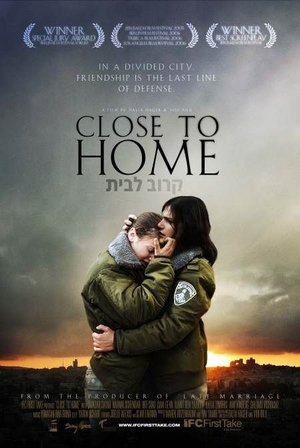
KAROV LA BAYIT (CLOSE TO HOME)
Israel, 2005, 90 minutes, Colour.
Smadar Sayar, Naama Schendar.
Directed by Dalia Hager and Vidi Bilu.
Close to Home is an Israeli film, filmed on location in the streets of Jerusalem and in the barracks, at the headquarters of the border police, at the borders themselves with their interrogation rooms. However, what makes it different, is that it is not about male soldiers but about Israeli women soldiers. The film focuses on two women. One is very shy and timid, a very nice girl. The other one is rather rebellious. The film shows in detail their work on the streets, with touches of humour, the friendship that actually binds them together. It also shows them having to deal with some of the difficulties of interrogations of Arab women, of explosions on the street and the consequences, on having to deal with crises.
The film focuses on the rebellious woman and the vitality of her life, getting around the rules, her relationships. The shy woman gradually is transformed, seeing her on her visits at home, the differenced that her family perceive.
The film was written and directed by two women, giving a female insight into the characters as well as the situation of women soldiers in contemporary Israel.
1.An Israeli film? A portrait of Israelis? Glimpses of Arabs? Local tensions? Images of tension? Feelings?
2.The title, Mirit and her military service, wanting to be away from home, her hopes? In fact, close to home?
3.The title and its reference to Israeli experience, these difficulties in Jerusalem, close to home?
4.The credits, the Palestinian woman, the close-up on her face, her being searched, the attitudes of the military women, harsh, the treatment, Dana and her protest, letting the women in, letting them go, being sentenced to jail?
5.Dubek and her tough manner, military background, obeying orders? Her supervising, her hard assistant? Her patrolling the streets? Being caught kissing her boyfriend? Giving the detail to Smadar and Mirit in the hotel, catching Mirit dancing, sending her to jail? The farewell to Julia and its warmth? The harsh stances, the military commander and his parade? Women in this military service?
6.Dana, her protest, going to jail? Mirit and her denunciation? Her meeting Mirit later in jail and her non-reaction?
7.Smadar and Mirit, eighteen years old, military service? Orders? Patrolling together? Smadar and her offhand manner, smoking, dawdling, her looking down on Mirit? Apprehensions about Dubek – and the mobile phone calls from the various women to let them know that she was supervising? Delays in the hat shop, the hairdresser’s? Eating? All against rules? The boyfriend, on the motorbike, at home with him? The bomb exploding, her changing attitude, Mirit’s helper? Going to Mirit’s home, the welcome by her parents, the room, the music? Catching Dubek and the kiss? At work in the hotel, allowing Mirit to dance? Merit going to prison, her visiting the helper, making demands on him? Her reaction? Going to prison, Mirit’s spurning her? The gift of the hat? The aftermath, the apologies, the growing bond? Her back at border duty, searching the woman, imposing the orders, the woman and her son eating and her refusal to obey? Getting her hair done, walking with Mirit, humorously stopping the Arab, his speculating about refusing to give his details – the men gathering round, attacking the Arab, the violence on him? The women asking them to stop? The final close-up freeze-frame of them on their bike?
8.Mirit, quiet, her parents? The orders, her conscientiousness, with Smadar and criticism of her? The visit to the home and the growing bonds? The hat shop? Catching Dubek and the kiss? The bomb, her injuries, the man helping her, seeking him out, walking past, his not recognising her? At the hotel, dancing? In prison, the encounter with Dana? Seeking out the man, he and his girlfriend and their laughing? Her antagonism towards Smadar, the change, the hat? The end with the violence on the man? On the back of the bike?
9.The glimpses of the other girls, walking in pairs, obeying the rules and not? Their way of life? Julia and her experience, going to Russia, the party and the farewell?
10.The glimpse of the parent generation, their memories? Their love for their daughters? Acceptance of military service?
11.The Arabs, the men, the humiliation, the workers late for buses, having to have their passes and IDs, the supervision on the buses? The final man and the violence that he experienced?
12.The bomb going off, the suicide bombs in Jerusalem, the effect?
13.The final allegory – of the Israelis misinterpreting the Arabs, wreaking violence on them?
14.The film from a women’s point of view, women writer-directors, the observation about women in the military, having to be with the men, like the men, expectations on them – yet their different approach?